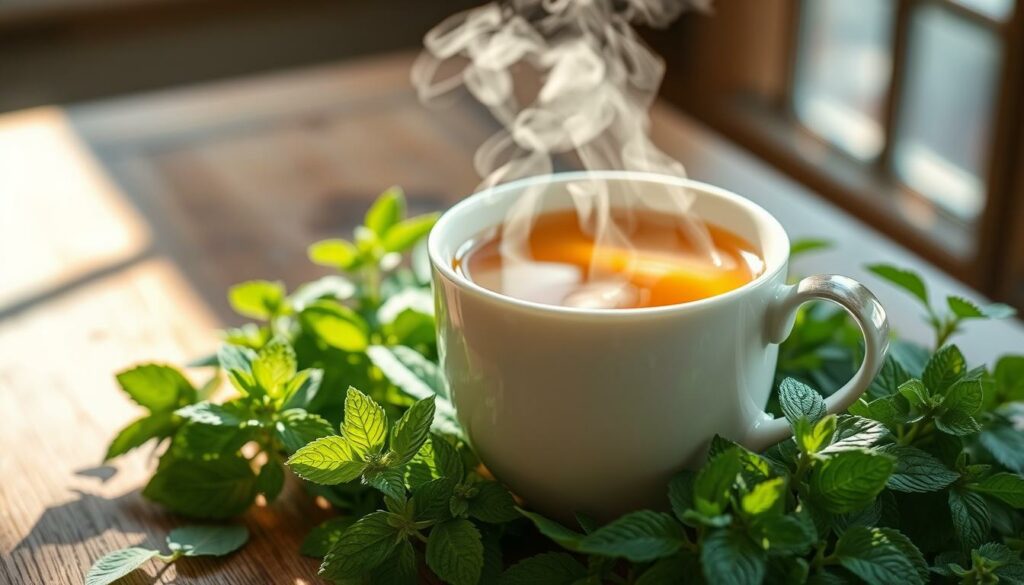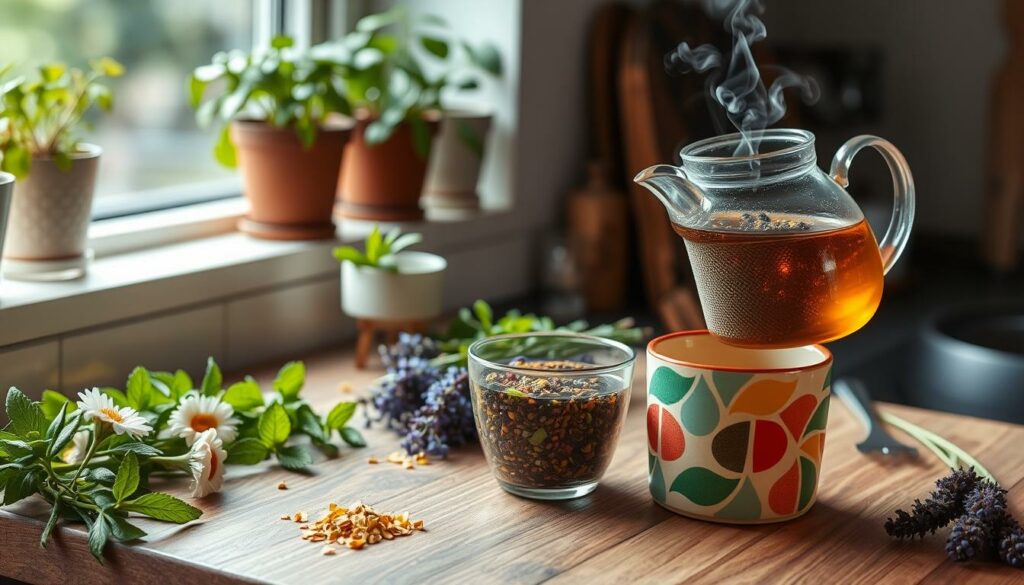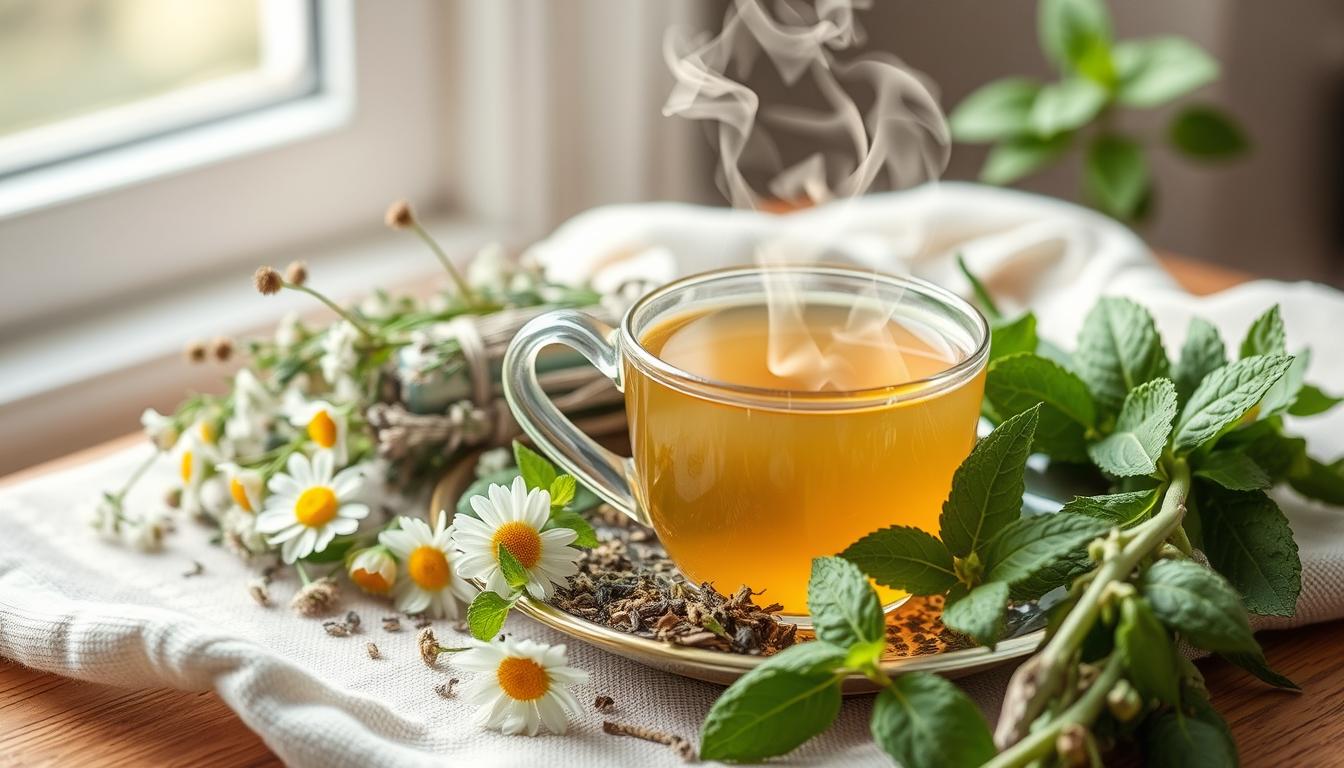Feeling down and looking for a natural way to feel better? Have you thought about using herbal teas to fight depression? We’ll look at the top herbal teas that can help you feel happier and reduce depression symptoms.
Key Takeaways
- Herbal teas can offer a natural and holistic approach to managing depression
- Certain herbs like chamomile, St. John’s Wort, and lemon balm have been shown to have mood-boosting and calming effects
- Green tea, with its l-theanine and antioxidant properties, can also contribute to improved mental health
- Incorporating a daily herbal tea ritual can be a soothing and effective way to support your overall well-being
- Consulting with a healthcare professional is recommended to ensure the safe and effective use of herbal remedies for depression
The Power of Herbal Teas in Combating Depression
For centuries, herbal remedies have helped people with mood disorders like depression. Studies now show that some herbal teas can lessen depression symptoms. This makes them a natural and helpful way to improve mental health.
A 2015 study looked at 11 studies and 13 reports. It found a link between drinking tea and a lower risk of depression. This shows that herbal teas might be good for fighting depression. They are also safer than regular antidepressants, which makes them more appealing to people looking to get better.
Herbal Remedies Have Been Used for Centuries to Alleviate Mood Disorders
Herbal teas have been valued for their mood-boosting effects for a long time. They come from ancient Chinese and Ayurvedic traditions. Today, as mental health issues become more common, more people are looking into natural antidepressants like herbal teas.
- Herbal teas have been used for centuries to alleviate mood disorders like depression.
- Research suggests that certain herbal teas can help reduce the symptoms of depression.
- Herbal remedies often come with fewer side effects compared to synthetic antidepressants.
“Drinking herbal tea has been a time-honored tradition for promoting mental well-being and alleviating mood disorders. As we continue to explore the power of nature, these ancient remedies are proving their worth in the modern world.”
Chamomile Tea: Nature’s Calming Elixir
If you’re looking for a natural way to relax and ease anxiety, chamomile tea is a great choice. It’s known for its calming effects. Many people use it to help with stress and get more restful sleep.
A study in 2016 looked at people with anxiety. It found that drinking chamomile tea helped reduce their anxiety. But, more studies are needed to prove this fully. Chamomile has compounds that might help calm the brain and reduce anxiety.
Chamomile tea also helps with sleep and relaxation. Its sweet smell can make you feel more calm. This can help you sleep better at night.
If you’re feeling stressed or can’t sleep because of anxiety, try chamomile tea. It’s a simple way to use nature’s calming effects in your life.
Next time you need to relax, try a cup of chamomile tea. Let its calming effects help you unwind.
St. John’s Wort Tea: A Potential Natural Antidepressant
If you’re looking for a natural way to fight depression, consider St. John’s wort tea. This herb has been around for centuries, helping people with mood issues, anxiety, and seasonal depression.
Studies Examining the Efficacy of St. John’s Wort for Depression
Studies on St. John’s wort for depression have had mixed results. A 2008 review looked at 29 studies from around the world. It found St. John’s wort was as good as prescription antidepressants for depression.
But a 2011 study said St. John’s wort didn’t really help with depression. This shows we need more research to know if it works.
Even with mixed results, many people find st. john’s wort tea helpful for depression. It’s thought to balance brain chemicals, like traditional antidepressants do.
| Study | Findings |
|---|---|
| 2008 Review | St. John’s wort was as effective for depression as prescription antidepressants. |
| 2011 Study | St. John’s wort didn’t show a clinically or statistically significant benefit for depression. |
The study on st. john’s wort tea for depression is still ongoing. Always talk to a doctor before trying it. They can help with the right amount and warn you about possible side effects with other medicines.
Herbal teas like st. john’s wort tea can be a good addition to regular treatments. But they shouldn’t take the place of seeing a doctor. Trying st. john’s wort tea might help you find a natural way to feel better and deal with depression.
Lemon Balm Tea: Elevating Mood and Cognitive Function
Looking for a calming yet uplifting drink? Try lemon balm tea. It’s a citrusy herb that helps with sleep, anxiety, and depression. Studies now show it’s great for your mental health.
A 2014 study in the European Review for Medical and Pharmacological Sciences looked at lemon balm’s effects on mood and anxiety. It found that lemon balm improved mood and lowered anxiety. This shows it could be good for mental health.
“The mild calming effect of lemon balm tea makes it a great pre-bed ritual for those seeking to enhance their mood and cognitive function.”
Lemon balm tea has a calming effect, which is great for those who can’t sleep or feel restless. It helps you relax and can improve your mental health.
To get the most out of lemon balm tea, make it a part of your daily life. Enjoy a cup before bed or when you’re stressed. It could be the natural fix you’ve been looking for.

Green Tea: A Multifaceted Powerhouse for Well-being
Green tea is one of the healthiest drinks out there. It’s packed with antioxidants that help your body and mind. Drinking it can make you feel better in many ways.
The Benefits of Green Tea’s L-Theanine and Antioxidants
Green tea has special compounds that make it great for health. It has caffeine to boost your brain and L-theanine to calm your nerves. Plus, it’s full of antioxidants like EGCG that fight off diseases and help you lose fat.
A study in 2009 found that older people who drank green tea felt less depressed. In 2013, another study showed that green tea raised dopamine and serotonin levels. These are chemicals that make you feel happy and less anxious.
Adding green tea to your daily life can really improve your health. You can drink it hot, cold, or take it as a supplement. It’s a drink that’s easy to get into and can make a big difference in your well-being.
Ashwagandha Tea: An Adaptogenic Ally
Ashwagandha is an ancient herb that helps your body handle stress well. It’s known for its health perks, like boosting brain function and lowering blood sugar and stress hormones. It also helps ease anxiety and depression symptoms.
Studies show ashwagandha can help with depression. For example, a 2012 study showed it cut down anxiety and depression in people with ongoing stress. A 2019 study found ashwagandha tea lowered anxiety and stress hormones, making it a good natural option for mood issues.
“Ashwagandha has been used in Ayurvedic medicine for centuries to help the body adapt to stress and promote overall well-being.”
Adding ashwagandha tea to your daily routine can be a simple way to boost your mental health. This herb’s adaptogenic traits help your body deal with stress’s negative effects. This could help ease depression and anxiety symptoms.
If you want to improve your well-being or find a natural way to handle mood swings, ashwagandha tea could be helpful. This ancient adaptogen can support your mental health and resilience.
Best Herbal Tea to Help Fight Depression
Fighting depression can feel tough, but adding the right herbal teas to your day might help. These teas can be a natural way to support your health. They shouldn’t replace medical advice, but they can be a good addition to your self-care.
Chamomile tea is a top choice for fighting depression. It’s known for calming you down and has been used for years to help with anxiety. Its soft, floral smell can make you feel more relaxed, which might help with depression symptoms.
St. John’s Wort tea is another good option. Many studies have looked into its use as a natural antidepressant. While opinions vary, some studies show it could improve your mood and overall well-being.
Lemon balm tea is also a great choice. It’s known to lift your mood and improve your thinking. The lemony taste of lemon balm can make you feel more awake and happy, which is often missing with depression.
“Incorporating the right herbal teas into your daily routine may provide a natural and complementary approach to support your well-being.”
Remember, these teas can help but shouldn’t replace medical advice. Depression is complex and needs professional help. Always talk to a doctor before trying new herbal remedies, as they might affect your medicines or have side effects.
Looking into these best herbal teas to help fight depression is a step towards better mental health. A mix of professional care, self-care, and natural remedies can really help. This approach can make a big difference in your mental health journey.
Incorporating Herbal Teas into Your Routine
Adding herbal teas to your daily routine can be easy and fun. It’s a great way to boost your mental health. Whether you want to how to brew herbal tea or how to enjoy herbal tea, here are some tips to get the most out of these teas.
Tips for Brewing and Enjoying Herbal Teas for Mental Health
Begin with fresh, high-quality herbs and spices for your tea blends. This makes sure you get the best from the plants. Pay attention to the steeping time to let the flavors and benefits fully mix into the water.
Feel free to try different herbal teas and mixes. Each one has special properties that can help you feel better. Enjoy the smell and taste of your tea, letting it be a moment of peace.
Adding these easy steps to your daily life can help you use herbal teas for better mental health. It can make you feel calmer and more well.

“Drinking herbal tea is not just about the physical benefits – it’s about the ritual, the mindfulness, and the connection to nature. It’s a moment of pause in a busy day.”
| Herbal Tea | Key Benefits for Mental Health |
|---|---|
| Chamomile Tea | Promotes relaxation and calmness |
| Lemon Balm Tea | Helps elevate mood and cognitive function |
| Ashwagandha Tea | Adaptogenic properties to manage stress |
Conclusion
Herbal teas are a natural way to support your mental health. They can help reduce symptoms of depression and anxiety. Teas like chamomile and green tea can be a great addition to your daily routine.
But remember, herbal teas are not a cure for depression. It’s a serious condition that needs professional help. Always talk to your healthcare provider about the teas you’re taking. This ensures you’re safe and well.
Combining herbal teas with professional advice is a good way to improve your mental health. Your well-being is very important. A balanced approach that includes natural remedies and expert care is key.
Don’t forget the power of herbal teas, but also seek comprehensive care for your mental health. This way, you can take care of yourself fully.

